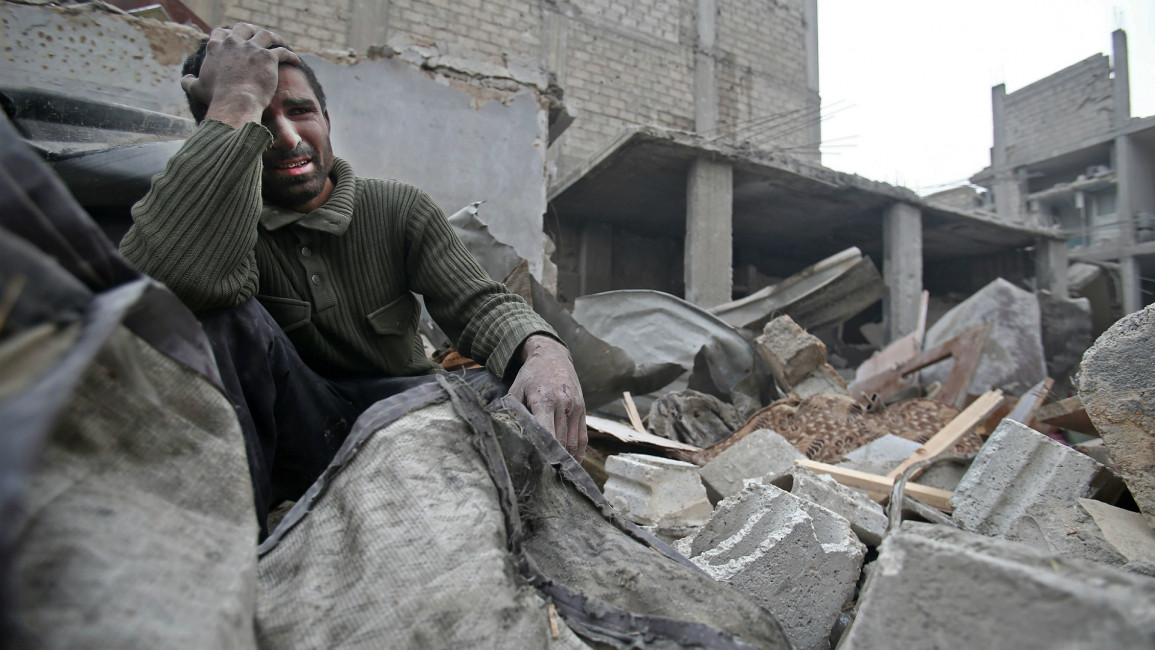'It's like the end of days': Bloody 24 hours as Syria, Russia escalate punishing attacks
Syrian opposition rescue teams pulled babies from incubators in a hospital under attack, rushing them to safety in a pick-up truck. Elderly patients lay motionless on the ground and rescue workers searched for survivors in the rubble of a destroyed apartment building as stepped up airstrikes by Syrian government forces and their Russian allies on the country's last remaining rebel strongholds killed at least 28 civilians on Monday.
"It is like the end of days," said Raed Saleh, the head of the first-responders known as White Helmets, describing the last 24 hours of attacks on the opposition-held eastern Damascus suburb of Ghouta and northwestern Idlib province.
The escalating offensive, which included a suspected chlorine attack a day earlier, reached a new ferocity after insurgents downed a Russian Su-25 over the weekend, the first time they scored such a major hit against the government's main ally, Moscow.
Russia has waged a punishing aerial campaign against Syria's armed opposition since intervening in the civil war on the side of its ally, President Bashar al-Assad, in 2015. Ceasefire deals have failed to quell the violence or restore humanitarian aid to besieged Ghouta, were 400,000 residents are holed up amid warnings of a looming humanitarian disaster.
"If a Russian plane was downed, revenge should not be on civilians and children," Saleh said. "Now more than any other day, we need the international community to restore the humanity it has lost in Syria."
 |
If a Russian plane was downed, revenge should not be on civilians and children... Now more than any other day, we need the international community to restore the humanity it has lost in Syria |  |
The al-Qaida-linked Levant Liberation Committee, which is the dominant militant group in Idlib, said its fighters shot down the Russian jet near the town of Saraqeb in Idlib province and killed its pilot after he ejected from the plane. Rebels have previously claimed to have downed Syrian government planes or drones, but it was the first time they hit a Russian aircraft.
| Read also: Syria rebels urge UN to condemn 'barbaric onslaught' on Idlib after Russia warplane downed |
Russia's military bases in western Syria were also hit last month in a series of drone attacks, challenging Moscow's gains in the country still torn by conflict.
Since then, activists say Russian and Syrian government forces have stepped up their attacks.
Activists and rescue workers reported at least 28 civilians, including six children, were killed on Monday in Ghouta, where nearly 40 airstrikes hit the suburb that is the last opposition stronghold in Damascus.
In Idlib, two hospitals have been hit with airstrikes since Sunday and at least 14 people killed. Rescue workers continued Monday to sift through the wreckage of a six-story building flattened a day earlier, pulling out three bodies after daylight. At least eight residents remained missing when the search was suspended at nightfall, one rescuer said.
In Idlib, a hospital in the town of Kafranbel was bombed early Monday, according to the activist-run Edlib Media Center and the Observatory. Another hospital, in Maaret al-Numan, was struck three times late Sunday and put out of service, according to the Syrian American Medical Society, which runs the facility.
The Syrian Observatory for Human Rights said at least 70 people were wounded Monday and the number of casualties was likely to climb as rescue operations got underway.
The dead included a rescue worker who was killed as his team searched for survivors in the town of Arbeen, which was hit by 15 airstrikes Monday afternoon.
Yousef al-Boustani, an opposition media activist in eastern Ghouta's Douma neighborhood, called the air raids "hysterical."
"We were seeing three planes in the air at a time," he said.
On Sunday, the White Helmets search-and-rescue group and a medical charity reported that several people suffered breathing difficulties after a suspected chlorine gas attack on Saraqeb, days after the Trump administration accused Assad's government of producing and using "new kinds of weapons" to deliver poisonous gases.
The White Helmets said three of its rescuers and six other people suffered breathing problems. The Syrian American Medical Society said its hospitals in Idlib treated 11 patients for suspected chlorine gas poisoning.
A UN investigative commission said in 2016 that the Syrian government was behind at least three chlorine gas attacks during the seven-year civil war, but activists and monitoring groups contend there have been more.
The Syrian conflict began when the Baath regime, in power since 1963 and led by President Bashar al-Assad, responded with military force to peaceful protests demanding democratic reforms during the Arab Spring wave of uprisings, triggering an armed rebellion fuelled by mass defections from the Syrian army.
According to independent monitors, hundreds of thousands of civilians have been killed in the war, mostly by the regime and its powerful allies, and millions have been displaced both inside and outside of Syria. The brutal tactics pursued mainly by the regime, which have included the use of chemical weapons, sieges, mass executions and torture against civilians have led to war crimes investigations.



